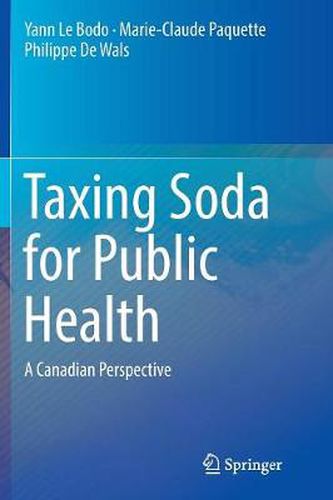Readings Newsletter
Become a Readings Member to make your shopping experience even easier.
Sign in or sign up for free!
You’re not far away from qualifying for FREE standard shipping within Australia
You’ve qualified for FREE standard shipping within Australia
The cart is loading…






This title is printed to order. This book may have been self-published. If so, we cannot guarantee the quality of the content. In the main most books will have gone through the editing process however some may not. We therefore suggest that you be aware of this before ordering this book. If in doubt check either the author or publisher’s details as we are unable to accept any returns unless they are faulty. Please contact us if you have any questions.
This timely reference analyzes the rationale, impact, and feasibility of taxation of sugar-sweetened beverages (SSBs) as a public health measure to contribute curbing obesity and diabetes rates, specifically in Canada. It presents the pros and cons of taxing soda, with the latest data on adverse health effects of its consumption, plus the various business and political issues surrounding the contentious proposition. Reviewed research is multidisciplinary, spanning health and medicine to ethics, economics, and law. Conclusions and caveats are clear and presented at a comfort level for the general reader. The result is a blueprint for analyzing the relevancy of taxes on sweetened soft drinks or other low-nutrition food products, plus a trove of valuable insights into aspects of government decision-making and consumer food behavior.
Included in the coverage:
* Reasons for specifically targeting SSBs
* SSB taxation as a public health policy instrument
* Effects of SSB taxation on energy intakes and population health
* Potential undesirable effects relating to SSB taxation
* Social and political acceptability of SSB taxation
* Evaluability of SSB taxation
Taxing Soda for Public Health will interest policymakers, public health professionals, advocacy groups, and researchers at the Canadian and international levels (e.g., in areas such as public health, nutrition, food and health policies, health economics, and evaluation), as well as students and all other parties interested in nutrition policies.
$9.00 standard shipping within Australia
FREE standard shipping within Australia for orders over $100.00
Express & International shipping calculated at checkout
This title is printed to order. This book may have been self-published. If so, we cannot guarantee the quality of the content. In the main most books will have gone through the editing process however some may not. We therefore suggest that you be aware of this before ordering this book. If in doubt check either the author or publisher’s details as we are unable to accept any returns unless they are faulty. Please contact us if you have any questions.
This timely reference analyzes the rationale, impact, and feasibility of taxation of sugar-sweetened beverages (SSBs) as a public health measure to contribute curbing obesity and diabetes rates, specifically in Canada. It presents the pros and cons of taxing soda, with the latest data on adverse health effects of its consumption, plus the various business and political issues surrounding the contentious proposition. Reviewed research is multidisciplinary, spanning health and medicine to ethics, economics, and law. Conclusions and caveats are clear and presented at a comfort level for the general reader. The result is a blueprint for analyzing the relevancy of taxes on sweetened soft drinks or other low-nutrition food products, plus a trove of valuable insights into aspects of government decision-making and consumer food behavior.
Included in the coverage:
* Reasons for specifically targeting SSBs
* SSB taxation as a public health policy instrument
* Effects of SSB taxation on energy intakes and population health
* Potential undesirable effects relating to SSB taxation
* Social and political acceptability of SSB taxation
* Evaluability of SSB taxation
Taxing Soda for Public Health will interest policymakers, public health professionals, advocacy groups, and researchers at the Canadian and international levels (e.g., in areas such as public health, nutrition, food and health policies, health economics, and evaluation), as well as students and all other parties interested in nutrition policies.